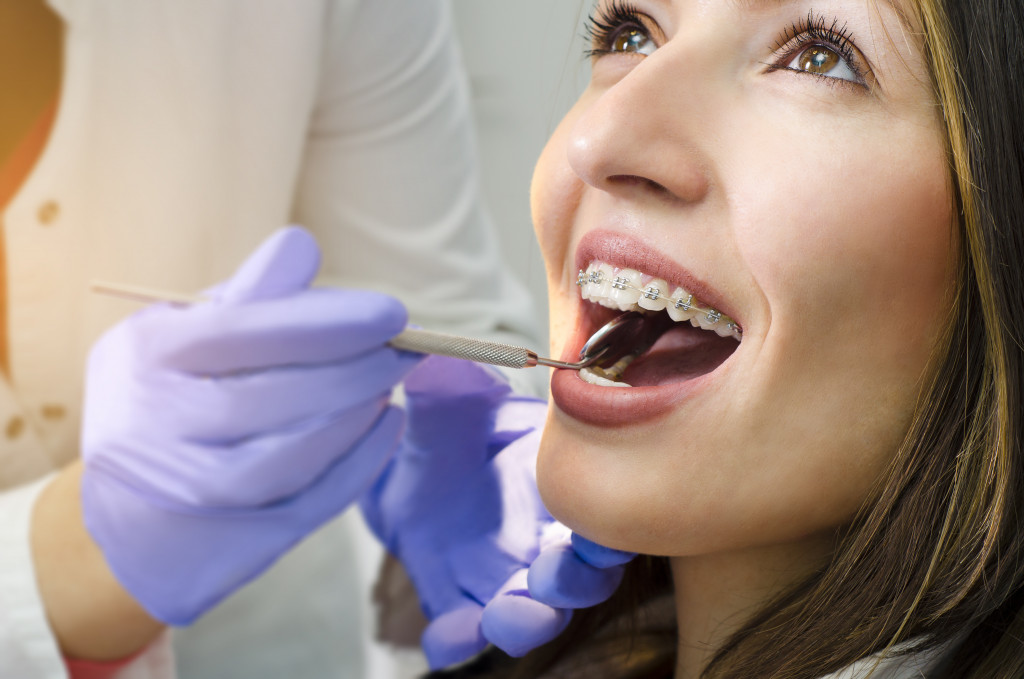- Good dental hygiene is essential for overall well-being.
- Daily brushing, flossing and using fluoride toothpaste are vital habits to maintain dental health.
- Mindful eating and drinking, quitting bad habits like smoking, and regular check-ups contribute to good dental health.
- Consider professional solutions such as dental implants for significant tooth loss.
- Taking care of your teeth now will lead to a lifetime of healthy smiles.
Taking care of your teeth is about more than just flashing a confident smile; it’s about maintaining your overall well-being. Poor dental health can lead to discomfort, serious medical conditions and even affect self-esteem. But don’t worry, looking after your teeth doesn’t have to be a chore. With simple daily routines and the right approach, you can ensure your pearly whites stay healthy and strong.
1. Daily Dental Hygiene Practices
Your dental health journey starts with the daily habits you form. Together, brushing and flossing keep the surface of your teeth and the spaces between them in top shape.
Here are the types of dental hygiene practices that you can do:
Choosing the Right Toothbrush
When brushing your teeth, the type of toothbrush you use matters. While there is a wide variety of types and brands available on the market, there are a few essential criteria to consider when choosing the right toothbrush for you.
Importance of Using Fluoride Toothpaste
Fluoride, a mineral with proven efficacy, serves as an effective deterrent against tooth decay. It works by strengthening the enamel and making it more resistant to acid attacks from plaque and sugars in our diet. Using fluoride toothpaste is the easiest way to ensure your teeth are getting this essential mineral on a daily basis.
The Proper Technique for Brushing Your Teeth

While most people know that brushing their teeth is essential, not everyone knows how to do it correctly. Proper brushing ensures that all areas of your mouth are cleaned and plaque is effectively removed. Firstly, hold your brush at a 45-degree angle to your gums and make short back-and-forth strokes.
Daily Flossing for Optimal Oral Health
Flossing is an essential part of daily dental hygiene practices, yet it’s often neglected. It helps remove plaque and bacteria from between your teeth, where your toothbrush can’t reach. There are various types of floss available, such as waxed, unwaxed, and flavored. Choose the type that you feel most comfortable using.
2. Mindful Eating and Drinking Habits
What you put into your mouth directly affects the health of your teeth and gums. Sugary snacks and acidic drinks can be your teeth’s worst enemies, leading to cavities and enamel erosion. Try to keep these to a minimum. Instead, nourish your body with foods that promote oral health—like crunchy fruits and vegetables, which help clean your teeth as you eat them.
Drinking water is also essential. Not only does it keep you hydrated, but it also helps wash away food particles and dilute acids produced by bacteria in your mouth. Consider water as your mouth’s natural cleanser, working to maintain your oral hygiene throughout the day. So, aim for plenty of water, and when you do indulge in something sweet, follow it up with a water rinse.
3. Kick the Bad Habits

Some habits harm your dental health, and it’s best to kick them to the curb. Smoking, for instance, is one of the biggest culprits when it comes to staining teeth and damaging your gums. It can lead to gum disease, tooth loss, and even oral cancer. If you smoke, seeking help to quit can be one of the best decisions you can make for your teeth.
Grinding your teeth, whether from stress or while you sleep, can also wreak havoc on your dental health. It can wear down your teeth and lead to jaw pain or TMJ disorders. If you think you might be grinding your teeth, talk to your dentist about a mouthguard to protect them while you work on managing your stress.
4. Regular Dental Check-Ups
Visiting your dentist regularly isn’t just for when you have a problem. Routine check-ups and cleanings are essential to catch issues early and keep your teeth and gums healthy. Your dentist can spot signs of potential problems, like cavities or early gum disease before they become serious—and much harder to treat.
During these visits, your dentist will also perform a professional cleaning to remove tartar build-up that brushing and flossing at home can’t handle. They can also give you personalized advice on improving your dental hygiene routine based on the condition of your teeth and gums. Aim for a check-up every six months or as your dentist recommends.
5. Considering Professional Dental Solutions
Despite your best efforts at home, sometimes you need a professional solution to restore your dental health. For those who have experienced significant tooth loss, professional all-on-4 dental implants can be a game-changer. This procedure involves replacing all teeth on either the top or bottom of your mouth with four implants.
All-on-4 dental implants provide a permanent, stable solution that looks and feels like natural teeth. Not only do they improve the appearance of your smile, but they also allow you to eat and speak confidently. The procedure has a high success rate and can be a smart investment in your long-term dental health. If you’re considering this option, your dentist can give you all the details and help you decide if it’s right.
Final Words
Your dental health is a vital part of your overall health, and it deserves your full attention. By integrating these daily habits, dietary considerations, and professional care into your routine, you’re setting yourself up for a lifetime of healthy smiles. Don’t underestimate the power of these simple steps—they can make a huge difference in your quality of life. Remember, the best time to start caring for your teeth was yesterday; the second best time is now.


